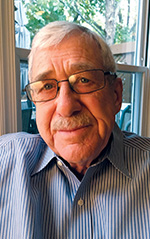Americans’ Welfare: It’s All in a Day’s Work
A consular officer remembers the personalities he encountered on the job.
BY CHARLES “TOM” OWENS
In my days as a Foreign Service officer, consular work was considered of less value and consequence than other embassy work. My time as protection and welfare officer (PWO) in Buenos Aires, however, showed me how wrong that assumption could be. It brought me into contact with interesting people, not to mention vexation, humor and humanity in unpredictable, even unfathomable, ways.
These people added immeasurably to my maturation—both professional and personal. Among the many memorable individuals who crossed my path in Argentina were two in particular—I’ll call them “Morris Cohen” and “Conrad von Blanton.” Their stories I share here.
I suspect that fewer opportunities exist today to do this kind of work with the same discretion and latitude I had back then, but am sure that today’s PWOs are still finding ways to get things done for Americans abroad in need of help.
Morris Cohen
One fall Friday afternoon, I was called to Ezeiza International Airport by Argentine immigration officials hesitant to admit an elderly, perhaps disoriented, passenger from the New York flight. On arrival I was directed to the coffee shop, where two uniformed officers sat with a small man wearing a fedora. An inspector handed me the U.S. passport of Morris Cohen—age 77, born in Greece—and said that Cohen was speaking “a very strange sort of Spanish.”
Introducing myself, I asked Cohen what brought him to Argentina. He had come to visit his brother. The only contact information he had was an address on an envelope. I asked whether the brother knew he was arriving today. He didn’t think so; it had been 25 years since they last met. The brother had immigrated to Argentina about the same time Cohen had immigrated to the United States. I asked him where he would spend the night, and he said with his brother. He then asked where we were, that he wanted to see his brother. I told the inspector that I would look after Mr. Cohen and take him to his brother’s house.
Night was falling, and the lights of Buenos Aires came into view across a long stretch of open fields. Cohen pointed and asked whether that was Manhattan.
“Buenos Aires,” I replied, “a city almost as big as New York.” He fell silent for more than 30 minutes.
Cohen spent the weekend days in my apartment, seated by the window. Having misplaced his dentures, he subsisted on soup, toast and tea.
Arriving at the address Cohen had, we found a small restaurant and bar. The barkeep said he did not know any Cohens. Neither did the occupant of the apartment over the bar. It was almost 8 p.m. People were beginning to fill the downtown area in search of weekend entertainment and dining. My weekend, on the other hand, was beginning with Morris Cohen, unsure of where he was or where he might find his brother.
I brought him to a hotel near my apartment. Giving the desk clerk my card, I asked to be told if Cohen decided to leave the hotel. Then to my handing him a few Argentine pesos, Cohen reacted with disdain at the “funny money.” I escorted him to his room with the bellhop, wished him a good night’s sleep, and then headed for home, dinner and bed.
Cohen spent the weekend days in my apartment, seated by the window. Having misplaced his dentures, he subsisted on soup, toast and tea. I called the local Jewish benevolent organizations and asked for help to get the word out to their community about Morris Cohen and to locate possible relatives. It was during these conversations that I learned the likely source of Cohen’s strange variety of Spanish: his family had almost certainly been Sephardic Jews, expelled from Spain during the Inquisition. He was speaking 15th-century Spanish.
Over the next three weekdays, Cohen sat in my office as I worked on his case and my other duties. The State Department replied to my report on Cohen’s situation—the Social Security Administration office in New York City could arrange to meet him upon arrival if he agreed to be repatriated to the United States.
Repatriation meant that the U.S. government would buy the return ticket, and that his passport would be marked as good only for return to the United States, until such time as the government was reimbursed for the ticket. I learned on Tuesday that the Jewish benevolent organizations were unable to find a trace of Cohen’s brother or other family members in Argentina. Cohen said that then he would go home.
As I got to work on repatriation, the ticket home presented a bit of a quandary: he had sent $50,000 to himself, c/o the Chase Bank in Buenos Aires. Someone with that kind of money should not be receiving government assistance for airfare. So I decided to send the money back to New York. (It had not “entered” Argentina yet, absent opening an account.) That way Cohen would have no resources in Argentina, and I could purchase the ticket with government funds in (relatively) good conscience. We processed the loan for his ticket on the Thursday afternoon flight.
In all the time that he spent in the chair in my office, Cohen had rarely spoken, except to ask after his brother or for help getting to the bathroom. Just before it was time for the airport, he asked me why I was here, in the embassy. I told him that the U.S. government had sent me to do the government’s work here; to underscore the point, I unfurled the large American flag that stood on a pole behind my desk.
It was not an auspicious beginning. Giving him my card, I urged him to register at the embassy and to let me know how he was getting along. Famous last words, these.
He stared at me and, after a long pause, said, “God put you here to take care of me.” I replied that maybe he was right, but it was time for us to go.
I was allowed to board the plane with Morris Cohen, to fasten his seat belt and to wish him good luck. I reminded him to visit the Dime Bank with his paperwork from Chase and that he would be met by some nice people from Social Security. When the plane was wheels up, I left the airport. Cohen arrived and was met by SSA as planned. I never heard anything more about him.
After almost a whole week never far from him, I reflected that I had probably done a few things not in the protection and welfare officer’s manual of best practices. Throughout my time as a PWO, I cannot claim that all my decisions about what was sensible and practical and expedient worked out as well as those I made for Morris Cohen.
Conrad von Blanton
The assistant manager of the toney Hotel Crillon in Buenos Aires called the embassy for help; several days earlier, he said, an American had checked in and had neither left his room nor allowed housekeeping staff to enter. Most alarming to the manager was that the American had a dog, who had not left the room either.
The desk clerk directed me to the room of Mr. Conrad von Blanton, who reluctantly let me in after I identified myself. The room was not nearly as bad as I had expected, though a certain tell-tale scent left no doubt that an animal was present. Said animal was “Bongo,” an adorable if annoying little dachshund who peered at me, shivering, from the bathroom.
Von Blanton explained that his mother was angry. He could not venture out while she was in this mood. I asked whether she was also staying at the Crillon. No, he replied, she was deceased. She came to him in dreams (or hallucinations), the source of his fearfulness. Argentina, he went on, was to be a new start where his trust-fund money would go further and his life would be calmer.
It was not an auspicious beginning. Giving him my card, I urged him to register at the embassy and to let me know how he was getting along. Famous last words, these.
Enclosed was another letter addressed to me from von Blanton. In it, he expressed his gratitude for everything I had done for him in Buenos Aires and for my being someone he could always depend on.
He did visit me at the embassy, dressed nattily in white, sporting a cane and a white Panama hat and a cigarette in an ivory holder, much like a character out of a Graham Greene novel. He also began calling me—at almost any time of the day or night—for assistance with interactions with Argentines, where to get household things done, and about his mother. He came to my office to discuss his life in Argentina and problems with those who controlled his trust.
Months went by, calls to get him out of one scrape or another became more and more frequent, and he became increasingly agitated and fearful of almost nightly “visits” from his mother. I told von Blanton that I could work on his return home if he wished. He would think about it. A big impediment was Bongo, who could not enter the United States without a long period of quarantine. A political officer and his wife (an unflappable and patient mother of four) agreed to take Bongo in; von Blanton agreed. I set the wheels in motion for his return to the United States with help from the Social Security Administration. He flew to Miami, where he was met successfully by SSA—after a daylong detour in Lima occasioned by a “visit” from his mother that resulted in his being taken off the original flight.
Soon after, I received a thank you note from von Blanton for helping him return home to a more stable life. But about two months later, I received a testy letter from the department—von Blanton’s attorney had informed State that I had stolen Bongo from him as he was leaving Argentina. After reporting on the circumstances surrounding the allegation, I was to return the dog to von Blanton immediately. I went hat in hand to Bongo’s hosts, who tearfully agreed to return him. After a series of required inoculations (at my own expense), and with proper Argentine and U.S. paperwork, Bongo was off to quarantine and, eventually, to von Blanton’s waiting arms. End of story … almost.
Sometime in the early 1970s, I received a letter from the American consul general in Milan, in which he regretted to inform me “of the death of your friend, Mr. Conrad von Blanton, after a fall from his hotel room window.” Enclosed was another letter addressed to me from von Blanton. In it, he expressed his gratitude for everything I had done for him in Buenos Aires and for my being someone he could always depend on. He was sorry if he had caused me trouble and would always remember me fondly as his closest friend.
During the more than a year I knew Conrad von Blanton, there were always problems, drama and tension with whatever he brought to my attention. Yet however frustrating and difficult he might have been, he was a gentle soul tortured by things beyond his control, and it seemed that he deserved a better best friend. And a better death than whatever sent him from that hotel window.




